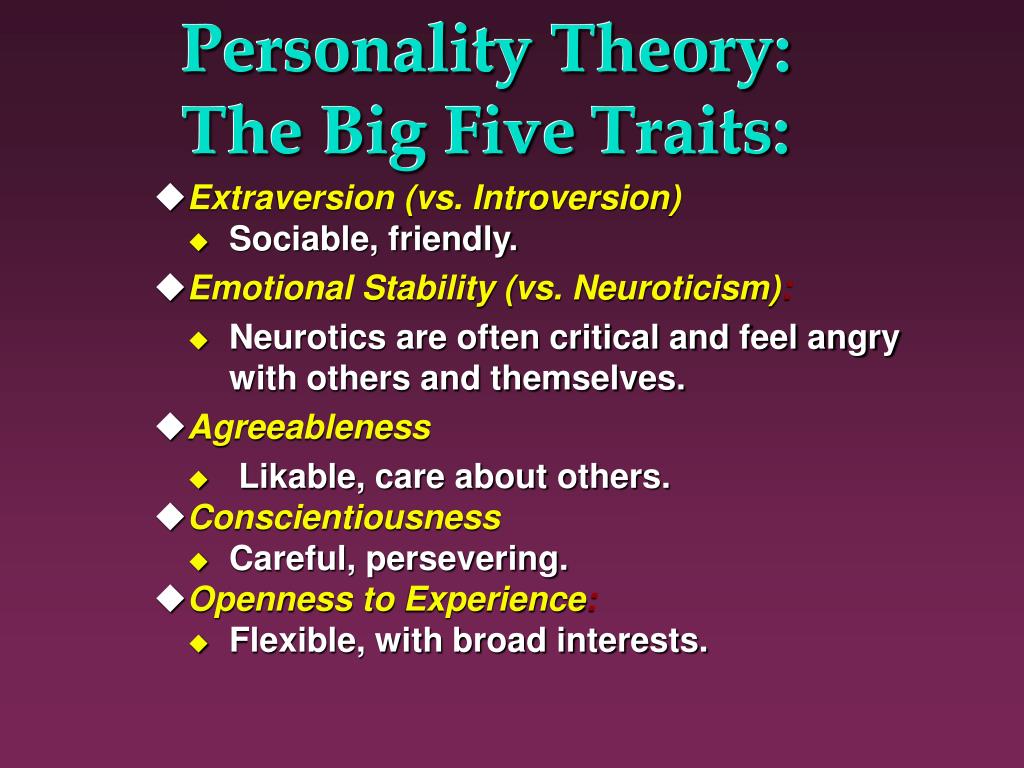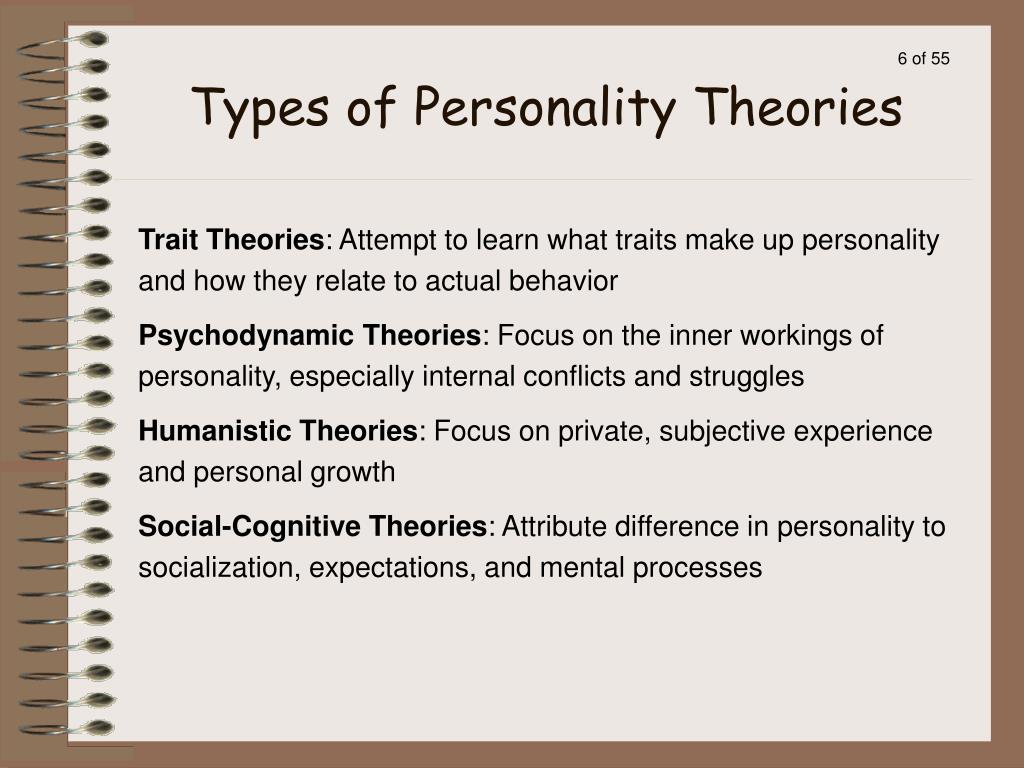
personality, a characteristic way of thinking, feeling, and blogger.comality embraces moods, attitudes, and opinions and is most clearly expressed in interactions with other people. It includes behavioral characteristics, both inherent and acquired, that distinguish one person from another and that can be observed in people’s relations to the environment and to the social group Personality – Top 5 Theories: Type Theory, Trait Theory, Psychoanalytic Theory, Social Learning Theory and the Humanistic Approach. Innumerable theories have been evolved on personality. Each theory exhibits one type of unique personality of an individual. However, following theories are considered to be more prominent among several theories Feb 20, · Trait theories of personality have long attempted to pin down exactly how many personality traits exist. Earlier theories have suggested a various number of possible traits, including Gordon Allport's list of 4, personality traits, Raymond Cattell's 16 personality factors, and Hans Eysenck's three-factor theory
What Are the Big 5 Personality Traits?
Personality means the constitution of mental as well as the physical health of an individual. Learn about:- 1. Introduction to Personality 2, personal theories of personality. Meaning of Personality 3. Definitions 4. Concept 5. Nature 6. Characteristics 7. Determinants 8, personal theories of personality. Stages of Personality Formation. Attributes Theories How to Predict Personality Traits?
Big Five Personality Traits Methods Used for Measuring Personality Development of Personality In modern organisations, personality attributes of a manager are considered important, since they affect the entire behavioural pattern of the person. In common parlance, personality refers to the impression, which an individual forms on others through his personal attributes making attractive or unattractive view. It is a fact that psychological factors of an individual are rarely known to others.
Personality is the whole aspect of an individual from general point of view. As in the ancient days masks were worn in Greece and Rome by actors, while enacting plays. Thus, personality is used for influencing others through external appearance. However, personality is not the external appearance alone.
Personality, which makes an individual to stand apart, is the impression of characteristic attributes. Some of these, which are of significant nature, are worth mentioning.
Omnibus — This personality view is the aggregate of recognizable pattern of properties-of qualities. Integration and configuration — Under this view of personality, the organisation of personal attributes is stressed, personal theories of personality.
Hierarchical — This aspect mainly deals with adaptation, survival and evolution of the person to the environment. Distinctiveness — the definition of this category speaks the uniqueness of each personality. From the above areas, G. Personality has a long history. It dates from the time of Greek physician Hippocrates BC. In order to understand the behaviour of people in the organisational setting, we need to know the basic nature of personality.
It is a psycho-social phenomenon, which analyses the cognitive features and presentation of individual in the society. Personality is made up of the characteristic patterns of thoughts, feelings and behaviour of an individual. These attributes make a person unique. Personality originates within the individual and remains fairly consistent throughout life, personal theories of personality.
Personality exhibits distinctive qualities of a person, especially those distinguishing personal characteristics that make one socially appealing. Personality reveals distinctive traits of mind and behaviour of a person. It is a pattern of collective character which includes behavioural, mental, temperamental, and emotional traits of a person that makes one socially appealing. It exhibits the quality of a person, which is personal theories of personality and impresses or disturbs others.
It is an act of courage thing in the face of life, the absolute affirmation of all that constitute the individual, the most successful adaptation to the universal, conditions of existence, coupled with the greatest possible freedom of self-determination. The basic components of personality refer to the personality trait. If one can predict the behaviour of individuals, modification of behaviour can be done in a smoother way towards achieving the organisational goals, personal theories of personality.
Each personality factor represents a collection of related or cluster of traits. These clusters of traits determine whether the individual is achievement-oriented, dominating, responsible, etc.
A number of definitions are given in respect personal theories of personality personality in order to give meaningful one. Let us extract some standard definitions. These methods are chosen by individuals based on several factors, personal theories of personality. Important one among these is their traits. A careful personal theories of personality of the above definitions will observe the followings:. It describes how an individual affects others, how he understands himself and his pattern of internal as well as external measurable traits.
It is the dynamic organisation within personal theories of personality individual of those psychological systems which determines his unique adjustment to the environment. It is the sum total of ways in which an individual reacts and interacts with others. The individual arrives at an adult psychological stage after passing successively through a series of maturational stages.
McClelland has stressed mainly the psychological aspects effecting desirable changes in the behaviour and personality of an individual. Hence, both these definitions throw some light on personality development and individual behaviour. Thus, both these definitions have utmost applicability and usefulness in organisational behaviour apart from the comprehensive approach made by Allport on the subject. Personality of an individual is unique, personal and a major determinant of his behaviour.
Because of differences in personality, individuals differ in their manner of responding to different situations. Some personality theorists emphasize the need to recognize the person-situation interaction, i.
Such an interpretation is highly meaningful to the study of human behaviour. Personality — Nature The nature of every personal theories of personality is attributed to his personality.
Generally, an individual asserts through his behavioural characteristics. Matured persons with their longstanding experience, take an objective attitude towards themselves and others. They also introspect, so as to help improve upon their nature and behaviour. There is a vast difference between human being and other species. Personality, off and on, does make adjustments according to the changes desired. Resistance to change, means a conflict with tension and unpleasantness.
Normally, people adapt to the changed situations and challenges. Adaptation to new situations often follows a modification in behavioural pattern leading to a smooth working condition and a conducive environment, personal theories of personality. Persons strive for achievement of goal. Individuals do have the drive to achieve goals.
Wants and needs lead to motive. The desire of an individual directs the behaviour for the fulfilment of the same. Both the physiological and social motives make behavioural personal theories of personality. Personality works in consistency by integrating various activities of mental and also experiences of the individual together. Personality differs in the form of its integration. Persons with developed personalities are highly integrated with values and experiences.
This depends on the standards of behaviour, which they have acquired right from the childhood. Is it in our genes or is it created more by the circumstances of our childhood? Of course the answer is both. There are bound to be genes which influence our behaviour simply because our brain and the chemicals that operate within it are made by genes.
But trying to find any one of the hundreds of genes involved is notoriously difficult. The genetics of behaviour is complex, because personalities are complex. Scientists are only just beginning to have any success in understanding how genes influence behaviour. Personality is psychological, but is used by biological needs and processes. Personality is displayed through thoughts, feelings, behaviours and many other ways.
Different theories propose different factors that determine an individual personality. The most popular research work done by Freud deals with the identification of self-concept. Self-concept include things factor got by nature like gene, i. The major determinants of personality are heredity, personal theories of personality, environment and situation.
Heredity refers to those factors, which predisposes to certain physical, mental and emotional states. It sets the outer parameters of an individual. It also limits the range of development of characters.
The studies reveal that twins though brought up in different places exhibit similar characters. Thus, heredity is the transmission of qualities from ancestor to descendent through, a mechanism lying primarily personal theories of personality the genes.
There are very many achievers in their own field like Sachin Tendulkar, U. Rao, N.
Measuring Personality: Crash Course Psychology #22
, time: 11:08Theories and Terminology of Personality Psychology

Theories. The development of personality is supported and attempted to be explained by theories of personality. Psychoanalytic Theory. The Psychoanalytic Theory of personality was developed by Sigmund blogger.com theory consists of three main ideas that make up personality, the id, the ego, and the blogger.com three traits control their own sections of the psyche Personality is the characteristic sets of behaviors, cognitions, and emotional patterns that evolve from biological and environmental factors. While there is no generally agreed upon definition of personality, most theories focus on motivation and psychological interactions with the environment one is surrounded by. Trait-based personality theories, such as those defined by Raymond Cattell The personality theories that underpin personality tests and personality quizzes are surprisingly easy to understand at a basic level. This section seeks to explain many of these personality theories and ideas. This knowledge helps to develop self-awareness and also to help others to achieve greater self-awareness and development too
No comments:
Post a Comment